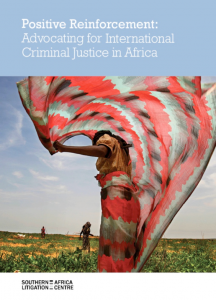
The fifth annual Public Interest Law Gathering (PILG) was held at the University of the Witwatersrand last month, and provided South African lawyers and civil society with an opportunity to reflect on issues affecting the public interest sphere and to discuss ways in which the law can be used as a tool for social change.
As in all previous years, the event featured fascinating discussions on diverse topics such as sentencing reform, reckless lending, and access to socioeconomic rights. However, the timing of the event this year was apposite, coming so soon after the litigation to compel the South African government to arrest Sudanese President Omar Al Bashir brought by the Southern Africa Litigation Centre (SALC), and the government’s violation of an interim order to prevent President Bashir leaving the country. This case incited many lively debates, but, as SALC’s director, Kaajal Ramjathan-Keogh, said at the recent Mandela Memorial Dialogue, while the issues that gave rise to the litigation may be contentious, what everyone seems to agree on is that the disregard shown for the court order by the government is deeply concerning.
There was a common thread running through many of the panel discussions at PILG that South Africa’s civil society may well be facing its greatest threat since the end of apartheid, and that the President Bashir litigation and the fiasco at this year’s State of the Nation Address in February may have ushered in a new chapter in the country’s democracy. The gathering therefore provided an opportunity for public interest law practitioners, and civil society more generally, to take stock of the condition of South Africa’s democracy and the mechanisms that can be used to create a more just and equal society. Many of the panels drew on the keynote address by Judge Navi Pillay, the former United Nations High Commissioner for Human Rights, who encouraged South Africans to use the law to advance social change. She said that public interest litigation is a valuable tool for holding power to account in the interests of the powerless – something particularly relevant to South Africa at this juncture.
The opening panel grappled with the question of whether democratic space in South Africa is narrowing, and all the speakers touched on different areas of concern. Dale McKinley, of Right 2 Know, explained that many activists are certainly under surveillance, and Section27’s Mark Heywood referred to the rumours that SALC and other organisations are the subject of a governmental probe into whether or not they are “fronts for western agendas”. There were also concerns raised about restrictive legislation such as the Non-Profit Organisation and the Secrecy Bills, as well as the handling of the Marikana massacre and the Farlam Commission of Inquiry’s report.
The President Bashir case has signalled a worrying disrespect for the rule of law on the part of the executive and various respected politicians, but the flipside is that the incident also reinforced the strength and independence of South Africa’s judiciary. Similarly, while there was a palpable sense of concern throughout PILG, there was also a resoluteness to the commitment to social justice. Our constitutional framework, combined with the diverse and dedicated civil society on display at PILG, means that the foundation is certainly there to respond to the threats to democracy. Mandeep Tiwana from CIVICUS spoke of the trend around the world of democracy increasing in form, but not in substance, and PILG certainly motivated South Africa’s public interest law community to work towards entrenching our constitutional democracy.
South Africa twenty years into democracy is obviously a very different place to South Africa under apartheid, but it is also very different to the country ten years ago. Many participants at PILG spoke of the need to recognise the new challenges as well as to utilise new mechanisms for change that improved technology and communications gives us. In order to achieve meaningful change – and to solidify our democracy – all sectors of society need to work together. Judge Navi Pillay highlighted that it is easy for us to criticise government action, but that we also have a responsibility to play our role in improving our society. Our constitution provides a fantastic framework for the protection of human rights but the realisation of these rights can only happen through citizen action. She said that if violations of rights are not brought to court, then “our Constitution and Bill of Rights will remain an empty shell.”
A democracy requires nurturing in order to grow and develop, and the attainment of a constitutional democracy in 1994 should be seen as only the first part of the story of our democratic country. Perhaps the challenges facing us now, twenty one years later, will act as a spur to all of us to take it upon ourselves to work for a true democracy in substance and not merely form. The participants at PILG certainly seemed to hope so.
This entry was posted in South Africa.



